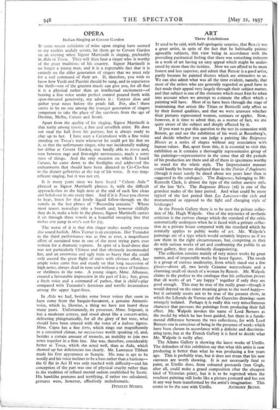OPERA
Italian Singing at Covent Garden IF some recent criticisms of mine upon singing have seemed to my readers unduly severe, let them go to Covent Garden on an evening when Signor Martinelli is singing, preferably in Aida or Tosca. They will then hear a singer who is worthy of the great traditions of his country. Signor Martinelli is no longer a young man, and it is a regrettable fact that it is entirely on the elder generation of singers that we must rely for a real command of their art. If, therefore, you wish to know how Verdi and Puccini should be sung, and to experience the thrill—one of the greatest music can give you, for all that it is a physical rather than an intellectual excitement—of hearing a fine voice under perfect control poured forth with open-throated generosity, my advice is : Carpete diem and gather your roses before the petals fall. For, alas ! there seems to be no one among the younger generation of singers competent to take the place of the survivors from the age of Destinn, Melba, Caruso and Scotti.
Apart from the quality of his singing, Signor Martinelli is that rarity among tenors, a fine and unselfish artist. He does not steal the ball from his partner, but is always ready to play up to her. I have seen a Cavaradossi with a fine voice standing on Tosca's train whenever he could get his feet on it, so that the unfortunate singer, who was incidentally making her debut at Covent Garden, was hardly able to move and, torn between rage and first-night nervousness, made a sorry mess of things. And the only occasion on which I heard Caruso, he came down to the footlights and addressed the endearments that should have been directed to Cio-Cio-San to the distant galleryites at the top of his voice. It was mag- nificent singing, but it was not art.
It is many years since we have heard " Celeste Aida " phrased as Signor Martinelli phrases it, with the difficult approach-shot to the high note at the end of each line clean and holed-out in one every time. And if it is Tosca you choose to hear, listen for that lovely liquid follow-through on the vowels in the last phrase of " Recondita armonia." Where most tenors nowadays take a breath and, however skilfully they do it, make a hole in the phrase, Signor Martinelli carries it on through three vowels in a beautiful sweeping line that makes one jump in one's seat for joy.
The worst of it is that this singer makes nearly everyone else sound foolish. Miss Turner is an exception. Her Turandot in the third performance was as fine as ever, a magnificent effort of sustained tone in one of the most trying parts ever written for a dramatic soprano. In spite of a head-dress that was not particularly Chinese and that obviously incommoded her, and an enormous and ugly train so heavy that she could only ascend the great flight of stairs with obvious effort, her ample voice came free and steady on that long succession of high notes, always dead in tune and without a trace of hardness or shrillness in the tone. A young singer, Mme. Albanese, created a favourable impression in the part of Liu ; but, given a fresh voice and a command of pathos, that is child's-play compared with Turandot's ferocious and terrific incantations among the upper leger-lines.
In Aida we had, besides some lower voices that seem to have come from the bargain-bassment, a genuine Amneris- voice, which is, likewise, a thing we have not heard these many years. Unfortunately, its possessor, Mme. Stignani, is but a moderate actress, and stood about like a concert-artist, delivering phlegmatically, for all the glory of her tone, what should have been uttered with the voice of a jealous tigress. Mme. Cigna has a fine forte, which rings out magnificently in a concerted climax, no mezza-voce worth speaking of, and, besides a certain amount of tremolo, an inability to join two notes together in a firm line. She was, therefore, considerably better as Tosca, which she acted well, than as Aida, which showed up her deficiencies too clearly. Mr. Lawrence Tibbett made his first appearance as Scarpia. His tone is apt to be woolly and his voice inclines to be a bass rather than a baritone— the G flat in Act II was only reached with difficulty—and his conception of the part was one of physical cruelty rather than in the tradition of refined mental sadism established by Scotti. His hawklike postures and terrifying, if rather too calculated, gestures were, however, effectively melodramatic.
DYNELEY HUSSEY.














































 Previous page
Previous page